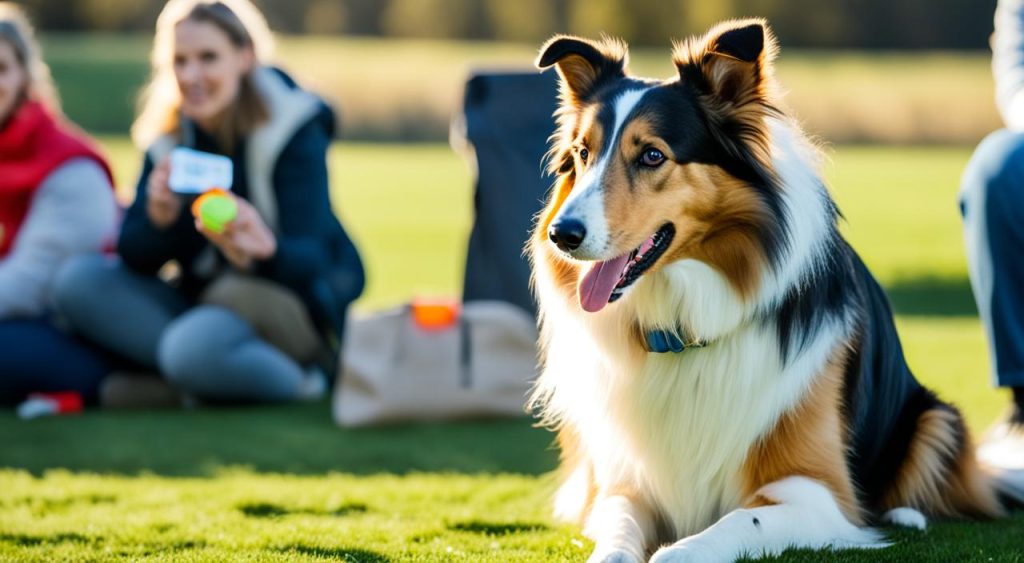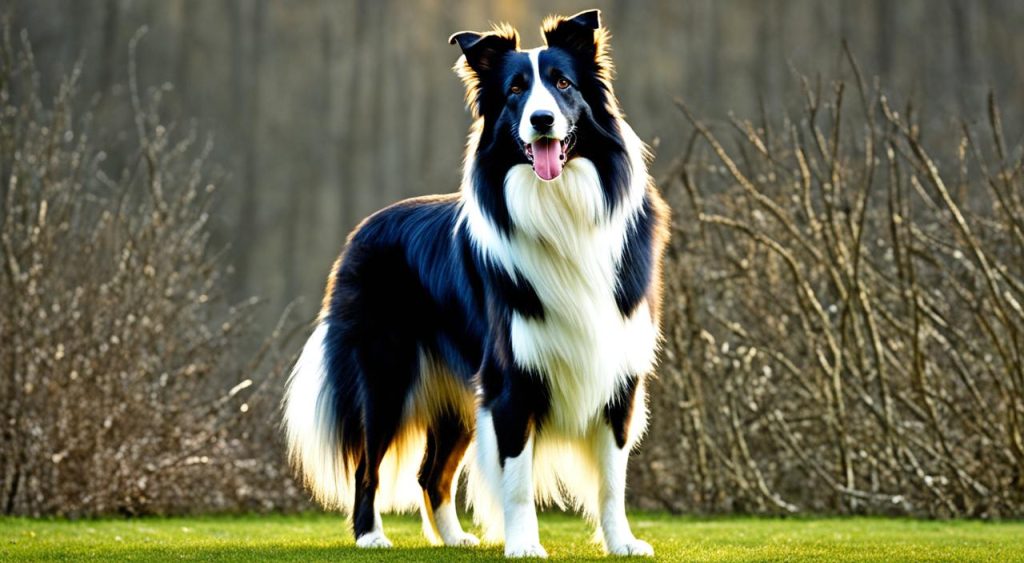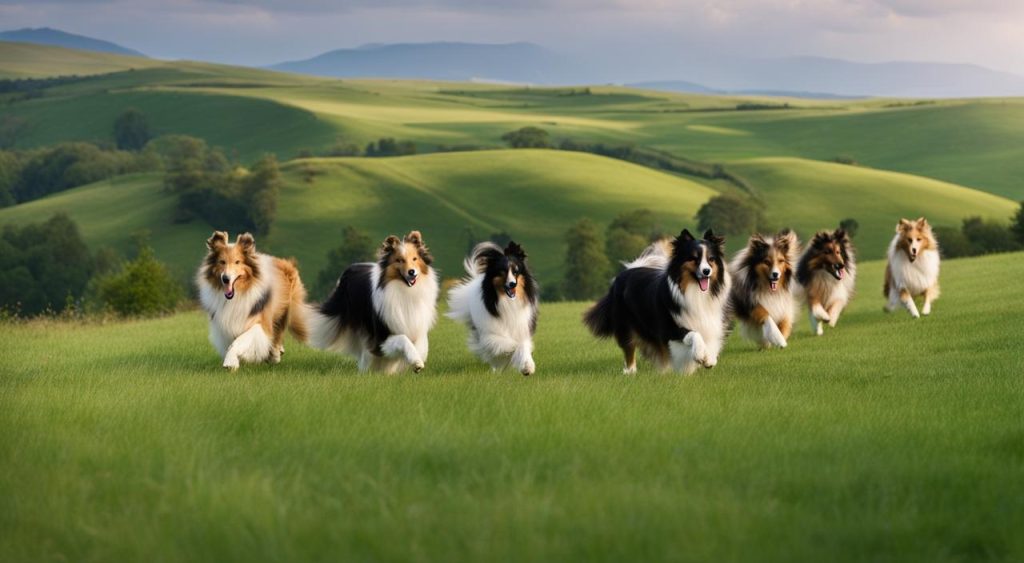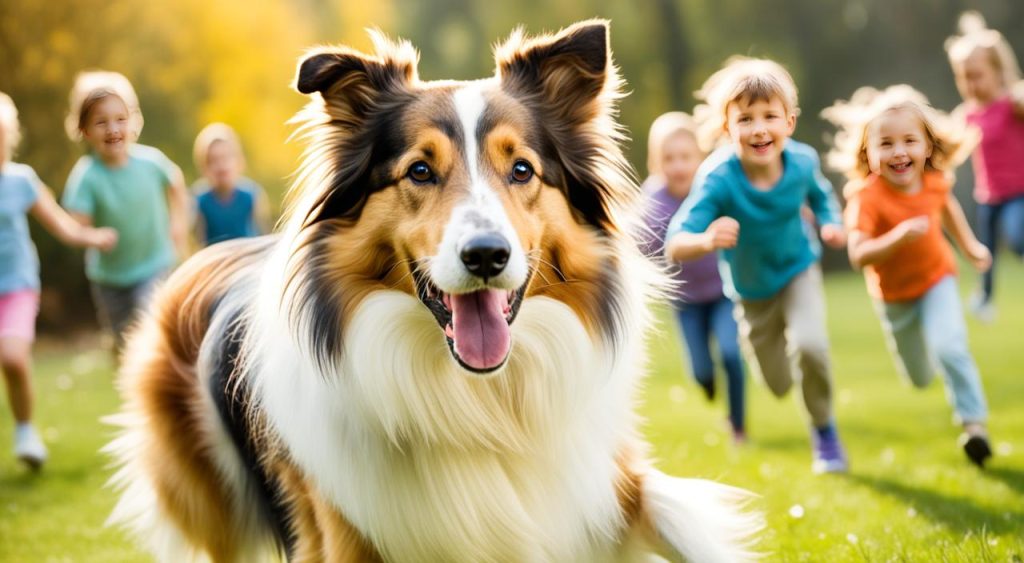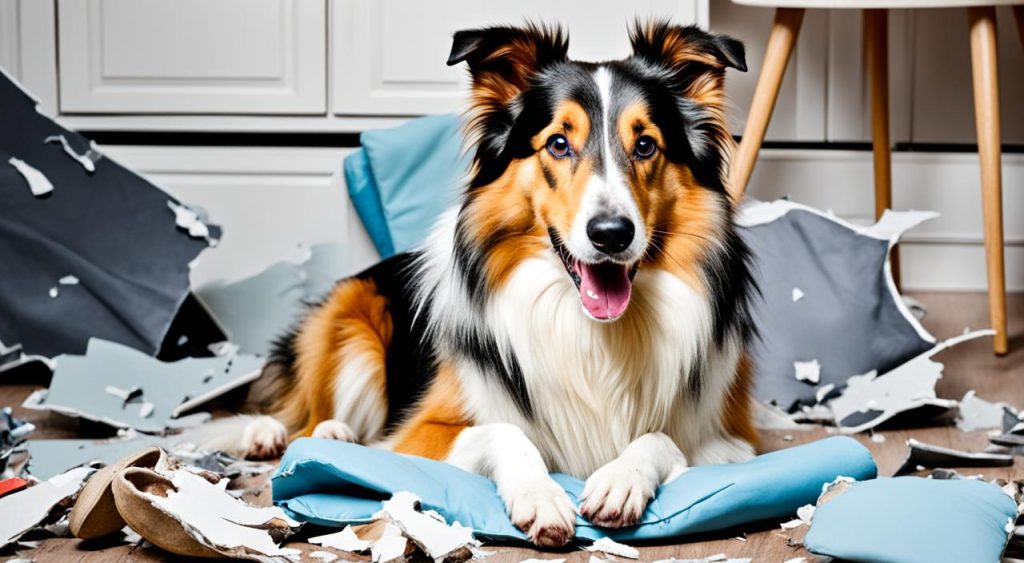Collies are known for their intelligence, loyalty, and desire to please their owners. If you are considering bringing a Collie into your family, you may be wondering about their trainability. Are Collies easy to train? The answer is yes! Collies are highly trainable dogs that respond well to consistent rewards-based training methods.
Early socialization and obedience training are recommended for Collies to help them develop into well-behaved and well-rounded dogs. Starting training from a young age is important, as Collies are capable of learning and adapting quickly. With patience, consistency, and positive reinforcement, you can teach your Collie a variety of commands and tricks.
Collies thrive on mental and physical stimulation, so it’s essential to provide them with plenty of daily exercise and mental challenges. They excel in activities like agility and herding events, as they enjoy having a job to do. Training sessions should be engaging, fun, and rewarding for both you and your Collie.
Key Takeaways:
- Collies are easy to train due to their intelligence and desire to please.
- Start training and socialization from a young age to maximize success.
- Use positive reinforcement and rewards to motivate and encourage desired behaviors.
- Provide mental and physical stimulation to keep your Collie engaged and happy.
- Consider engaging in activities like agility or herding events to challenge your Collie’s abilities.
Training a Collie: Getting Started
When it comes to training a Collie, starting early and being consistent is key. Whether you have a Collie puppy or an adult dog, establishing a strong foundation in training is essential for their overall development and behavior.
One of the first areas to focus on is potty training. Teach your Collie puppy where to go to the bathroom by using consistent cues and providing regular opportunities for them to eliminate outside. Rewards such as treats and praise can reinforce desired behaviors, making the training process more effective.
In addition to potty training, it is important to introduce basic commands and leash training. Teaching commands like “sit,” “stay,” and “come” will not only enhance your Collie’s obedience but also their safety in various situations. Using positive reinforcement during these training sessions, such as treats and verbal praise, will motivate your Collie to respond and learn.
Collies are eager to please and will respond well to reward-based training. With consistent practice and patience, you’ll be amazed at how quickly your Collie can pick up on commands and behaviors.
Another helpful training technique is crate training. Collies, like many other breeds, can benefit from having a designated safe space where they can relax and feel secure. A crate can provide this secure environment and also aid in potty training and preventing destructive behaviors when you are unable to supervise your Collie.
Remember, consistency and positive reinforcement are key when training a Collie. By starting early, focusing on potty training, basic commands, leash training, and crate training, you’ll be setting your Collie up for success in their training journey.
Collie Training: Best Practices
When it comes to training your Collie, there are some best practices that can help you achieve success. By following these tips, you can ensure that your Collie learns effectively and becomes a well-behaved and obedient dog.
First and foremost, it’s essential to approach training with a calm, firm, and confident demeanor. Collies are sensitive to their owner’s wishes and respond well to positive reinforcement. By maintaining a calm and assertive presence, you can establish yourself as a trusted leader in your Collie’s eyes.
Set clear rules and boundaries from the beginning of your training sessions. Consistency is key when it comes to training a Collie. By consistently reinforcing the same commands and expectations, your Collie will learn what is expected of them and be more likely to comply.
Positive reinforcement is another crucial aspect of training a Collie. Use treats, praise, and rewards to reinforce desired behaviors. Collies are eager to please and will respond well to this type of training approach.
Avoid using punishment or harsh corrections during training. This can be counterproductive and create a negative association with the training process. Focus on rewarding good behavior rather than punishing bad behavior.
Lastly, building a strong bond with your Collie is vital for successful training. Engage in regular training sessions and positive interactions with your Collie. This will not only strengthen your relationship but also make training more enjoyable for both of you.
By following these best practices, you can effectively train your Collie and establish yourself as a respected leader. Remember to be calm, firm, and consistent, while also incorporating positive reinforcement and building a strong bond. With time and dedication, your Collie will become a well-mannered and obedient companion.
Collie Training: House Training
House training is an important aspect of Collie puppy training. To avoid accidents and promote good bathroom habits, you need to establish a routine for taking your Collie outside to eliminate.
Consistency is key when house training your Collie. Use the same cues and rewards each time your Collie goes outside to reinforce the desired behavior. This will help them understand what is expected of them. Patience and consistency are crucial as accidents may happen during the training process.
It’s important to note that punishment is not effective in house training. Instead, clean up accidents calmly and refrain from scolding or reprimanding your Collie. This will prevent them from associating negative experiences with the act of eliminating.
Puppies have limited bladder control, so it’s essential to enforce regular potty breaks. Take your Collie outside for bathroom breaks at consistent intervals throughout the day. This will help them develop a routine and learn to hold their bladder.
Remember, house training requires time and effort. Stay consistent, provide positive reinforcement, and be patient with your Collie. With proper training and guidance, they will soon develop good house manners.
Collie Training: Basic Commands
Teaching basic commands is essential for a well-behaved Collie. Start with commands like “sit,” “down,” and “stay.” Use positive reinforcement and rewards to encourage your Collie to follow commands. Collies are intelligent and eager to please, making them quick learners.
Training your Collie in basic commands not only establishes good behavior but also strengthens your bond with your pet. Consistency is key when teaching commands like “sit” or “down.” Use treats as a reward when your Collie successfully follows a command, and offer verbal praise and affection as reinforcement.
Remember to use clear and concise verbal cues in conjunction with hand signals to ensure your Collie understands the intended command. For example, say “sit” while simultaneously using a hand motion to signal the command. This association helps your Collie recognize and respond to the command more effectively.
Once your Collie has mastered the basics, you can move on to more advanced commands and tricks. Advanced commands like “heel,” “leave it,” and “fetch” build upon the foundation established through basic training and provide mental stimulation for your Collie.
Training your Collie in basic commands lays the groundwork for a well-behaved and obedient companion. With consistency, patience, and positive reinforcement, your Collie will become proficient in following basic commands and will be ready to tackle advanced training with ease.
Collie Training: Addressing Barking
Excessive barking can be a common behavior among Collies, especially when they experience boredom or loneliness. It is crucial to address this behavior through proper training and effective techniques. By implementing Collie obedience training and following these Collie training tips, you can help control your Collie’s barking:
- Teach the “speak” and “quiet” commands: Training your Collie to understand these commands can provide you with better control over their barking. Start by teaching them to bark on command (“speak”) and then introduce the cue to stop barking (“quiet”). Consistently reinforce these commands with rewards to encourage desired behavior.
- Provide mental and physical stimulation: Boredom can often lead to excessive barking. Ensure your Collie’s daily routine includes sufficient mental and physical stimulation. Engage in regular playtime sessions, provide interactive toys, and consider activities such as puzzle games or agility training to keep them mentally and physically occupied.
- Prevent loneliness: Collies are social dogs and may bark excessively when left alone for extended periods. Make sure your Collie has regular social interactions with people and other pets. If necessary, consider hiring a dog sitter or enrolling them in daycare to keep them company during the day.
If despite your efforts, excessive barking continues to be a problem, it is advisable to consult with a veterinarian or behavioral specialist. They can provide further guidance and help identify any underlying issues contributing to your Collie’s excessive barking.
Collie Training: Herding Behavior
Collies are known for their natural herding instinct, which can sometimes lead to undesirable behaviors, such as nipping at heels. To ensure that your Collie doesn’t engage in herding behavior towards humans or other animals, it’s crucial to incorporate proper training techniques. Working with a professional trainer or behaviorist can be highly beneficial in addressing and redirecting this instinct.
One effective approach is to focus on teaching your Collie appropriate behaviors, such as walking calmly on a leash and following commands. This will help redirect their energy and fulfill their natural drive in a controlled manner. By consistently reinforcing positive behaviors and discouraging herding behaviors, you can manage and retain better control over your Collie’s actions.
Training your Collie to stop herding behavior requires patience, consistency, and positive reinforcement. As you work to correct this behavior, it’s important to remain calm and avoid using harsh corrective measures, as they can be counterproductive and harm the bond between you and your Collie. Instead, focus on building a strong and trusting relationship through positive training experiences.
Collie Training: Socialization
Socialization is a crucial aspect of Collie puppy training and plays a vital role in ensuring that your Collie grows up to be a well-mannered and confident dog. By exposing your Collie to various people, animals, environments, and sounds from a young age, you can help them develop a positive and accepting attitude towards the world.
Gradually introduce your Collie to new experiences, carefully monitoring their reactions and providing reassurance when needed. Make sure to create positive interactions during socialization by offering treats, praise, and playtime, as this will help your Collie associate new situations with positive outcomes.
Remember, the key to successful socialization is to expose your Collie to different environments and stimuli in a gradual and controlled manner. This will allow them to build confidence and feel comfortable in various situations.
Socialized Collies are more likely to be friendly and accepting of new people, animals, and experiences. They are less likely to exhibit fearful or aggressive behaviors, making them easier to handle in various settings.
Now, let’s move on to the next section, where we will discuss effective techniques for training your Collie in basic commands.
Conclusion
Collies are known for their intelligence and trainability, making them an ideal choice for anyone looking for an easy-to-train dog. With the right approach and consistent training methods, Collies can quickly pick up new commands and behaviors.
Early socialization is key to ensuring that your Collie develops into a well-behaved and confident companion. By exposing them to various people, animals, and environments from a young age, you can help them become more adaptable and friendly.
Positive reinforcement training, using rewards and praise, is highly effective with Collies. They thrive on pleasing their owners and will eagerly learn new tricks and commands when they are motivated by positive feedback.
Remember, training should start early, and it’s important to provide mental and physical stimulation to keep your Collie engaged and happy. Collies are active dogs that enjoy learning and participating in agility or herding events. With the right training, Collies can be a joy to train and live with, becoming well-mannered and loyal companions.

